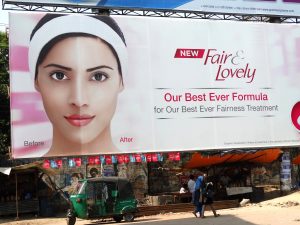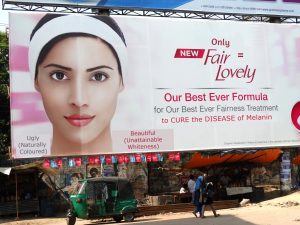The Original Ad – Fair & Lovely

The advertisement I chose to focus on for the Culture Jam assignment is from Fair & Lovely. Fair & Lovely (launched in 1975) is a popular cosmetics company in South and Southeast Asia (ie. India, Pakistan, Bangladesh, Sri Lanka, Indonesia, Thailand, etc.) that creates skin-lightening products such as creams and facewashes (https://en.wikipedia.org/wiki/Fair_%26_Lovely_(cosmetics)). The company profits off of the idea that beauty is associated with, if not equivalent to, fairness and many-a-times esteemed actors can be seen in the company’s adverts.
The reason I chose this specific ad was due to the use of the statement “Fairness Treatment” as it feeds the pre-existing notion that darker and melanin-rich skin is a disease that needs to be cured. The ‘before and after’ picture of a desi woman (from South Asia and its diaspora) is also concerning. The skin tone of the woman in the ‘before’ frame is normal for those from these regions while the skin tone in the ‘after’ frame is almost unattainable and is rarely natural. Furthermore, the name of the company “Fair & Lovely”, as mentioned before, promotes colourism and that fairness is the desired ideal of beauty.
Fair & Lovely is not the only company of its kind. There are many other companies that only focus on skin-lightening products and companies like Vaseline, that also sell fairness creams. These products are not only targeted to women but also to men (ie. Fair and Handsome). The obsession with light-skin and fairness, especially in the desi diaspora, can be understood from reading history. Since the 14th century, the Indian Subcontinent has been visited, invaded, colonized and/or ruled by the Portuguese, Dutch, French, Mughals, and British, who are all fair in complexion. As a result “being subject to a succession of white(ish) overlords has long associated light skin with power, status and desirability among Indians” (https://theconversation.com/bleached-girls-india-and-its-love-for-light-skin-80655). Though many have begun to speak up about this epidemic of skin-bleaching, these products are so prominent and are so easily available that these discussions are yet to have any effect on the products’ popularity.
References:
“Fair & Lovely (Cosmetics).” Wikipedia, Wikimedia Foundation, 21 June 2019, en.wikipedia.org/wiki/Fair_%26_Lovely_(cosmetics).
Mishra, Neha, and Ronald Hall. “Bleached Girls: India and Its Love for Light Skin.” The Conversation, 30 Sept. 2019, theconversation.com/bleached-girls-india-and-its-love-for-light-skin-80655.
The Culture Jammed Ad – Only Fair = Lovely

The alterations made in the advertisement focus on the wordings of the advertisement. The first modification I made was to the name of the company/brand from “Fair & Lovely” to “Only Fair = Lovely” to signify the real intention of the brand that being fair is the only point that needs to be taken into consideration when determining a person’s beauty. Secondly, I modified the “Before” and “After” to “Ugly (Naturally Coloured)” and “Beautiful (Unattainable Whiteness)” to better highlight the perception that one is better than the other, and that people should be ashamed of being naturally melanin-rich rather than white-skinned like our European counterparts. Lastly, I modified the statement from the original ad: “Our Best Ever Formula for Our Best Ever Fairness Treatment” to “Our Best Ever Formula for Our Best Ever Fairness Treatment to CURE the DISEASE of Melanin”. The original message of the advertisement implies the same message that I have added: Fair & Lovely is the cure for the disease of having darker skin, however, I focused on the choice of the word “treatment” and completed the harmful assumption that melanin requires treatment.
The goal of the culture jamming I have done is to help individuals see the true goal of brands like Fair & Lovely which is: profit off of propagating internalized colourism and shaming people for not being white. They continue to sell their products by making users feel insecure with their appearance, feel pressured to use these products and use them out of compulsion to become beautiful, worthy, and even happy.
Everyone is born the way they are and should learn to love themselves and be comfortable in their own skin. More importantly, people should not judge others on the basis of their skin tone. Though internalized colourism is difficult to look past considering it has been there for countless generations, I hope that this culture jammed ad can help people look past these oppressive opinions and realize that they do not need to be fair to be lovely.